Home » Jazz Articles » Bailey's Bundles » Notable & Nearly Missed in 2013
Notable & Nearly Missed in 2013
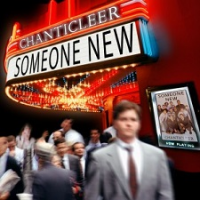 Chanticleer—Someone New (Chanticleer, 2013). Chanticleer got some attention for two recent holiday releases in Christmas II: Two (Almost New) Chanticleer Christmas Offerings . For the holiday season, the 12-man a cappella choral group releases a collection of intelligently selected popular music in Someone New. Chief among these songs is Freddie Mercury's "Somebody to Love" and Tom Wait's "Temptation," both of which are arranged at the edge, taking artistic chances that pay off. June Carter Cash's "Ring of Fire" is transformed.
Chanticleer—Someone New (Chanticleer, 2013). Chanticleer got some attention for two recent holiday releases in Christmas II: Two (Almost New) Chanticleer Christmas Offerings . For the holiday season, the 12-man a cappella choral group releases a collection of intelligently selected popular music in Someone New. Chief among these songs is Freddie Mercury's "Somebody to Love" and Tom Wait's "Temptation," both of which are arranged at the edge, taking artistic chances that pay off. June Carter Cash's "Ring of Fire" is transformed. 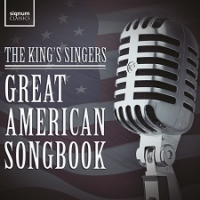 The King's Singers— Great American Songbook (Signum Classics, 2013). With a singing capacity half that of Chanticleer, The King's Singers deliver an impressive punch with air-tight harmonies and inventive arrangements cast within a fairly conservative framework. The Great American Songbook is the vehicle here, spread over two discs: one, a cappella, the other, orchestral. There is a bit of overlap between the two performances, with some reworking of the vocal arrangements. "My Funny Valentine" and "I've Got The World on a String" shimmer, while "Begin the Beguine" swings with a gentle confidence and aplomb. These are not "standard" performances of the standards, but they do possess an internal genius in both arrangement and delivery.
The King's Singers— Great American Songbook (Signum Classics, 2013). With a singing capacity half that of Chanticleer, The King's Singers deliver an impressive punch with air-tight harmonies and inventive arrangements cast within a fairly conservative framework. The Great American Songbook is the vehicle here, spread over two discs: one, a cappella, the other, orchestral. There is a bit of overlap between the two performances, with some reworking of the vocal arrangements. "My Funny Valentine" and "I've Got The World on a String" shimmer, while "Begin the Beguine" swings with a gentle confidence and aplomb. These are not "standard" performances of the standards, but they do possess an internal genius in both arrangement and delivery. 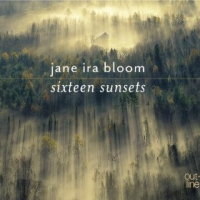 Jane Ira Bloom—Sixteen Sunsets (Outline, 2013). Colleague Dan McClenaghan notes that on Sixteen Sunsets, forward- thinking soprano saxophonist Jane Ira Bloom looks back exploring nine standards peppering an additional five original compositions presented in a quartet setting. Add to this that Sixteen Sunsets has been nominated for a 2014 Grammy Award for Best Surround-Sound Album. Why is this recording important? First there is Bloom's superb tone. It is both friendly and welcoming, dry with a smooth, rounded exterior that reveals a clean shine at velocity. Second is Bloom's ballad playing "The Way You Look Tonight" and "But Not For Me" and languid smooth. Bloom is thoughtfully in total command of the material and completely confident in her performance.
Jane Ira Bloom—Sixteen Sunsets (Outline, 2013). Colleague Dan McClenaghan notes that on Sixteen Sunsets, forward- thinking soprano saxophonist Jane Ira Bloom looks back exploring nine standards peppering an additional five original compositions presented in a quartet setting. Add to this that Sixteen Sunsets has been nominated for a 2014 Grammy Award for Best Surround-Sound Album. Why is this recording important? First there is Bloom's superb tone. It is both friendly and welcoming, dry with a smooth, rounded exterior that reveals a clean shine at velocity. Second is Bloom's ballad playing "The Way You Look Tonight" and "But Not For Me" and languid smooth. Bloom is thoughtfully in total command of the material and completely confident in her performance. 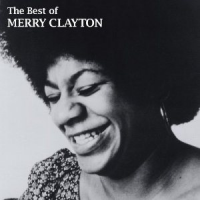 Merry Clayton—The Best of Merry Clayton (Sony Legacy, 2013). Singer Merry Clayton is popularly known for two things: first, being the older sister of Little Feat percussionist Sam Clayton and, second, for her burn-the- house-down vocals on the Rolling Stone's "Gimme Shelter." But Clayton was a recording leader in her own right. The Best of Merry Clayton was drawn from Clayton's six recordings made between 1969 (Gimme Shelter (Ode Records)) and 1994 (Miracles (A&M Records)). Her covers of Neil Young's "Southern Man" and Simon and Garfunkle's "Bridge Over Troubled Waters" demonstrated what the next logical evolutionary step in soul music was after the Memphis/Muscle Shoals era.
Merry Clayton—The Best of Merry Clayton (Sony Legacy, 2013). Singer Merry Clayton is popularly known for two things: first, being the older sister of Little Feat percussionist Sam Clayton and, second, for her burn-the- house-down vocals on the Rolling Stone's "Gimme Shelter." But Clayton was a recording leader in her own right. The Best of Merry Clayton was drawn from Clayton's six recordings made between 1969 (Gimme Shelter (Ode Records)) and 1994 (Miracles (A&M Records)). Her covers of Neil Young's "Southern Man" and Simon and Garfunkle's "Bridge Over Troubled Waters" demonstrated what the next logical evolutionary step in soul music was after the Memphis/Muscle Shoals era. 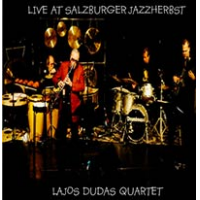 Lajos Dudas Quartet- -Live at Salzburger Jazzherbst (Jazz Sick Records, 2013). Avant-garde clarinetist Lajos Dudas assembles a percussion-heavy sans bass quartet for a live performance at the Salzburg Jazz Festival on October 29, 2012. Drummer Kurt Billker and percussionist Joshen Buttner make this a wide-open rhythmic affair with guitarist Philipp van Endert holding down the harmonic map. Dudas plays like Jimmy Giuffre possessed by the spirit of Benny Goodman in the midst of a post-modern "Sing Sing Sing." Dudas does toss in some standard among the ten selections performed here. He delivers an "All The Things You Are" as would be envisioned by saxophonist Lee Konitz and pianist Martial Solal and an "All Of Me" that is as simple as it is profound.
Lajos Dudas Quartet- -Live at Salzburger Jazzherbst (Jazz Sick Records, 2013). Avant-garde clarinetist Lajos Dudas assembles a percussion-heavy sans bass quartet for a live performance at the Salzburg Jazz Festival on October 29, 2012. Drummer Kurt Billker and percussionist Joshen Buttner make this a wide-open rhythmic affair with guitarist Philipp van Endert holding down the harmonic map. Dudas plays like Jimmy Giuffre possessed by the spirit of Benny Goodman in the midst of a post-modern "Sing Sing Sing." Dudas does toss in some standard among the ten selections performed here. He delivers an "All The Things You Are" as would be envisioned by saxophonist Lee Konitz and pianist Martial Solal and an "All Of Me" that is as simple as it is profound. 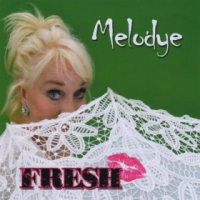 Melodye—Fresh (Potted Plant Records, 2013). Vocalist Melodye Dewine is a kindred spirit of and friend with on clarinetist/raconteur Mort Weiss. What that tells us is that a recording by one Melodye will be chock full of surprises, and we are not surprised by Fresh. Talent with a sense of humor is in a sorely short supply that Melodye intends to correct. With full orchestra, Melodye swings through a seemingly straight "Diamonds Are A Girl's Best Friend" before turning into a tribute to Spike Jones, replete with bells and whistles. "Bollywood Daddy" is a mashup of Juan Tizol's "Caravan" with the Cole Porter standard "My Heart Belongs To Daddy." Melodye gives a brilliant Lawrence Welk treatment of "I've Got a Crush On You," while she and trumpeter/singer Jack Sheldon reprise a very adult "Baby It's Cold Outside" from her 2005 release Nocturnal Velvet (SMS Jazz). Melodye's voice is full as a pair of pouty lips not getting their way and is appealing the say way that Dean Martin's superb instrument was...never taking itself too seriously.
Melodye—Fresh (Potted Plant Records, 2013). Vocalist Melodye Dewine is a kindred spirit of and friend with on clarinetist/raconteur Mort Weiss. What that tells us is that a recording by one Melodye will be chock full of surprises, and we are not surprised by Fresh. Talent with a sense of humor is in a sorely short supply that Melodye intends to correct. With full orchestra, Melodye swings through a seemingly straight "Diamonds Are A Girl's Best Friend" before turning into a tribute to Spike Jones, replete with bells and whistles. "Bollywood Daddy" is a mashup of Juan Tizol's "Caravan" with the Cole Porter standard "My Heart Belongs To Daddy." Melodye gives a brilliant Lawrence Welk treatment of "I've Got a Crush On You," while she and trumpeter/singer Jack Sheldon reprise a very adult "Baby It's Cold Outside" from her 2005 release Nocturnal Velvet (SMS Jazz). Melodye's voice is full as a pair of pouty lips not getting their way and is appealing the say way that Dean Martin's superb instrument was...never taking itself too seriously. 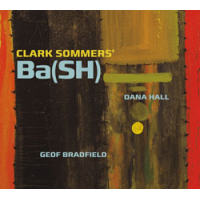 Clark Sommers—Clark Sommers' Ba(SH) (Origin Records, 2013). The spirit of Thelonious Monk abounds on bassist Clark Sommers' Ba(SH). Monk's music is magnetically drawn to odd formats like this saxophone trio, sporting Geof Bradfield on reeds and Dana Hall on drums. There is no tether in this music; all participant are free in the most free sense. The recital hold together well, with Bradfield's intricate nod to Monk's "Rhythm-n-Ing" providing an example of the long arm of Monk. There are elements of Ornette Coleman's '50s and '60s music. Sommer's "Garrison" is tuneful without being tied down, Hall's shimmering cymbals filling in the blank spaces. The disc closes with Monk's "Think of One," a proper coda indeed.
Clark Sommers—Clark Sommers' Ba(SH) (Origin Records, 2013). The spirit of Thelonious Monk abounds on bassist Clark Sommers' Ba(SH). Monk's music is magnetically drawn to odd formats like this saxophone trio, sporting Geof Bradfield on reeds and Dana Hall on drums. There is no tether in this music; all participant are free in the most free sense. The recital hold together well, with Bradfield's intricate nod to Monk's "Rhythm-n-Ing" providing an example of the long arm of Monk. There are elements of Ornette Coleman's '50s and '60s music. Sommer's "Garrison" is tuneful without being tied down, Hall's shimmering cymbals filling in the blank spaces. The disc closes with Monk's "Think of One," a proper coda indeed. 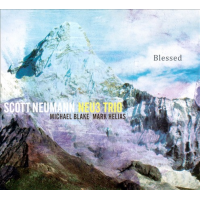 Scott Neumann—Neu3 Trio— Blessed (Origin Records, 2013). Another reeds trio had an auspicious offering in Neu3 Trio—Blessed. Drummer Scott Neumann hosts multi-reedist Michael Blake and bassist Mark Helias in nine compellingly free original compositions plus one well-selected Roswell Rudd piece. This recording is not without its Monk influence. "Keep Your Heart Right" is right out of the Monk rhythmic playbook via Roswell Rudd, with a theme that trips over itself while still remaining upright and heading in a swingtime direction. Blake's melodica gives "Garbanzo" a certain Middle Eastern/Far Eastern flavor, coupled with Neumann's polyrhythms (straight out of the Elvin Jones songbook.
Scott Neumann—Neu3 Trio— Blessed (Origin Records, 2013). Another reeds trio had an auspicious offering in Neu3 Trio—Blessed. Drummer Scott Neumann hosts multi-reedist Michael Blake and bassist Mark Helias in nine compellingly free original compositions plus one well-selected Roswell Rudd piece. This recording is not without its Monk influence. "Keep Your Heart Right" is right out of the Monk rhythmic playbook via Roswell Rudd, with a theme that trips over itself while still remaining upright and heading in a swingtime direction. Blake's melodica gives "Garbanzo" a certain Middle Eastern/Far Eastern flavor, coupled with Neumann's polyrhythms (straight out of the Elvin Jones songbook.  David Helbock—David Helbock's Random/Control— Think of Two (Traumton Records, 2013). Strange Monk- inspired trios abound. Few will be more beautifully strange than David Helbocks's Random/Control —Think of Two. This is a trio led by Austrian pianist David Helbock who plays a host of real and imagined keyed instruments. Add to him Johnannes Bar who plow through any number of brass instruments as Andreas Broger does any number of reeds instruments and beyond. Here is a hint: a sousaphon plays a very large roll here. This is carefully-crafted, playful music from all over the world, rendered with a Central Europe flavor. Craggy rhythms and melodies with no foreseeable direction make this offering endlessly enjoyable.
David Helbock—David Helbock's Random/Control— Think of Two (Traumton Records, 2013). Strange Monk- inspired trios abound. Few will be more beautifully strange than David Helbocks's Random/Control —Think of Two. This is a trio led by Austrian pianist David Helbock who plays a host of real and imagined keyed instruments. Add to him Johnannes Bar who plow through any number of brass instruments as Andreas Broger does any number of reeds instruments and beyond. Here is a hint: a sousaphon plays a very large roll here. This is carefully-crafted, playful music from all over the world, rendered with a Central Europe flavor. Craggy rhythms and melodies with no foreseeable direction make this offering endlessly enjoyable.  Hristo Vitchev / Liubomia Krastev—Rhodopa (First Orbit Sounds, 2013). Guitarist Hristo Vitchev has impressively established his niche in jazz, and music at large. Concentrating on original compositions that are highly impressionistic, Vitchev has created more than a sound, he has created a landscape of sound. Rhodopa is Vitchev's duet recording with clarinetist Liubomir Krastev. The pair's jumping off point are their native Bulgarian folk melodies, presented as if in a dream, light as mist. Krastev's tone is slippery, devoid of any woodiness, except in the lowest of registers. Vitchev allows a bit of Latin guitar into his consciousness, informing his playing with warmth and character. If there is criticism for Vitchev, it is the musical embarrassment of riches he provides regularly.
Hristo Vitchev / Liubomia Krastev—Rhodopa (First Orbit Sounds, 2013). Guitarist Hristo Vitchev has impressively established his niche in jazz, and music at large. Concentrating on original compositions that are highly impressionistic, Vitchev has created more than a sound, he has created a landscape of sound. Rhodopa is Vitchev's duet recording with clarinetist Liubomir Krastev. The pair's jumping off point are their native Bulgarian folk melodies, presented as if in a dream, light as mist. Krastev's tone is slippery, devoid of any woodiness, except in the lowest of registers. Vitchev allows a bit of Latin guitar into his consciousness, informing his playing with warmth and character. If there is criticism for Vitchev, it is the musical embarrassment of riches he provides regularly.  Various Artists—I Heard the Angels Singing: Electrifying Black Gospel From the Nashboro Label, 1951- 1983 (Tompkins Square, 2013). Mike McGonigal follows his critically acclaimed anthologies Fire In My Bones: Raw, Rare & Otherworldly African-American Gospel 1944- 2007 (Tompkins Square, 2009) and This May Be My Last Time Singing— Raw African- American Gospel On 45rpm 1957-1982 (Tompkins Square, 2011) with this third collection that brings together recordings from the Nashville gospel label Nashboro. Mostly raw, this is the most thrilling music made, largely with no interference from name labels. McGonigal emerges as the Paul Oliver of gospel music, with these three volumes his Saints and Sinners (Document, 1994).
Various Artists—I Heard the Angels Singing: Electrifying Black Gospel From the Nashboro Label, 1951- 1983 (Tompkins Square, 2013). Mike McGonigal follows his critically acclaimed anthologies Fire In My Bones: Raw, Rare & Otherworldly African-American Gospel 1944- 2007 (Tompkins Square, 2009) and This May Be My Last Time Singing— Raw African- American Gospel On 45rpm 1957-1982 (Tompkins Square, 2011) with this third collection that brings together recordings from the Nashville gospel label Nashboro. Mostly raw, this is the most thrilling music made, largely with no interference from name labels. McGonigal emerges as the Paul Oliver of gospel music, with these three volumes his Saints and Sinners (Document, 1994). 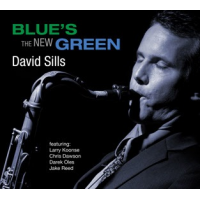 David Sills—Blue's The New Green (Gut String Records, 2013). Saxophonist David Sills has come a long way since 1999's Journey Together (Naxos), maturing into a fully developed musician. Blue's The New Green finds Sills in the company of guitarist Larry Koonse and bassist Darek Oles from that earlier effort, making a full-bodied ballads disc with one or two exceptions. Sonny Rollins' "No Moe" hums from the start with its jaggy hard bop finish while "I'm A Fool To Want You" is ballad perfection. Sills plays his "Blues in Ten" on flute, spinning out a Hank Mobley line in the head. Sills is not going to set any fires, but this is as good a mainstream jazz recording as can be hoped for.
David Sills—Blue's The New Green (Gut String Records, 2013). Saxophonist David Sills has come a long way since 1999's Journey Together (Naxos), maturing into a fully developed musician. Blue's The New Green finds Sills in the company of guitarist Larry Koonse and bassist Darek Oles from that earlier effort, making a full-bodied ballads disc with one or two exceptions. Sonny Rollins' "No Moe" hums from the start with its jaggy hard bop finish while "I'm A Fool To Want You" is ballad perfection. Sills plays his "Blues in Ten" on flute, spinning out a Hank Mobley line in the head. Sills is not going to set any fires, but this is as good a mainstream jazz recording as can be hoped for. 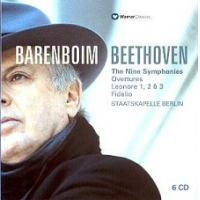 Daniel Barenboim/Staatskapelle Berlin—Beethoven—The Nine Symphonies (Warner Classics, 2013). Re-released as mp3s and a budget CD box in 2012, Barenboim's 2000 Beethoven Symphony set with the Staatskapelle Berlin is far and away the most affordable offering of this splendidly performed mountain of music. These performances are 100% modern instruments, modern practices affairs that compare most closely with Sir Georg Solti's fine 1990 Decca set. Muscular and full-throated, this is the Beethoven Karajan would have made had he lived so long. Barenboim handles the early symphonies with a steady hand retaining just enough Haydn/Mozart flavor to propel the music to their logical conclusion at the feet of a monumental Third. The rest is perfection a light speed. Roll over, Beethoven, tell Tchaikovsky the news....
Daniel Barenboim/Staatskapelle Berlin—Beethoven—The Nine Symphonies (Warner Classics, 2013). Re-released as mp3s and a budget CD box in 2012, Barenboim's 2000 Beethoven Symphony set with the Staatskapelle Berlin is far and away the most affordable offering of this splendidly performed mountain of music. These performances are 100% modern instruments, modern practices affairs that compare most closely with Sir Georg Solti's fine 1990 Decca set. Muscular and full-throated, this is the Beethoven Karajan would have made had he lived so long. Barenboim handles the early symphonies with a steady hand retaining just enough Haydn/Mozart flavor to propel the music to their logical conclusion at the feet of a monumental Third. The rest is perfection a light speed. Roll over, Beethoven, tell Tchaikovsky the news.... 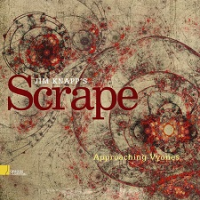 Jim Knapp's Scrape— Approaching Vyones (Origin Classical, 2013). Twenty-first Century Orchestral Music. For a string orchestra named Scrape, this music is quite well behaved and well- integrated. Approaching Vyones is composed of ten short pieces, each independent of the other, yet melding well as a whole. Guitarist Bill Frisell contributes one piece, "Naomi" to the collection, while the remainder of the selections are Jim Knapp compositions. Traces of Barber and Piston can be heard among the floating harmony and gentle rhythm, with a hint of introspective Bernstein. Knapp composes very accessible modern classical music that can open the doors and minds or a new generation for orchestral music.
Jim Knapp's Scrape— Approaching Vyones (Origin Classical, 2013). Twenty-first Century Orchestral Music. For a string orchestra named Scrape, this music is quite well behaved and well- integrated. Approaching Vyones is composed of ten short pieces, each independent of the other, yet melding well as a whole. Guitarist Bill Frisell contributes one piece, "Naomi" to the collection, while the remainder of the selections are Jim Knapp compositions. Traces of Barber and Piston can be heard among the floating harmony and gentle rhythm, with a hint of introspective Bernstein. Knapp composes very accessible modern classical music that can open the doors and minds or a new generation for orchestral music. 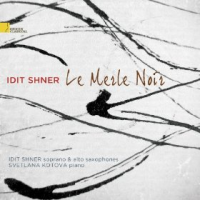 Idit Shner— Le Merle Noir (Origin Classical, 2013). Dr. Idit Shner has released two previous recordings for the Origin Arts imprint: Tuesday's Blues (2009) and Fissures: 20th Century Music for Saxophone and Harp (2010). The multi- reedist returns with her second Origin Classic release addressing the music of a host of 20th Century composers, including Philip Glass and Olivier Messiaen. She plays alto and soprano saxophones, producing from each a studied, vibratoless tone that, in the case of the soprano horn, sounds like a clarinet (no mean feat). Accompanied by pianist Svetlana Kotova, Shner navigates this often craggy and angular musical terrain with care and precision. The Glass pieces are of particular interest possessing a more complex rhythmic character than much of the composers other music. This release is those wanting to go off the beaten path and hear something new, accessible and smart.
Idit Shner— Le Merle Noir (Origin Classical, 2013). Dr. Idit Shner has released two previous recordings for the Origin Arts imprint: Tuesday's Blues (2009) and Fissures: 20th Century Music for Saxophone and Harp (2010). The multi- reedist returns with her second Origin Classic release addressing the music of a host of 20th Century composers, including Philip Glass and Olivier Messiaen. She plays alto and soprano saxophones, producing from each a studied, vibratoless tone that, in the case of the soprano horn, sounds like a clarinet (no mean feat). Accompanied by pianist Svetlana Kotova, Shner navigates this often craggy and angular musical terrain with care and precision. The Glass pieces are of particular interest possessing a more complex rhythmic character than much of the composers other music. This release is those wanting to go off the beaten path and hear something new, accessible and smart.  Yitzhak Yedid—Arabic Violin Bass Piano Trio—Suite in Four Movements (Self Produced, 2013). Dr. Yitzhak Yedid, Australian pianist and composer provides a moody and anxious landscape on his Arabic Violin Bass Piano Trio—Suite in Four Movements. Yedid employs a spectrum of piano techniques upon which arabic violinist Sami Kheshaiboun three- dimensionally prints Yedid's arid melodies in rich autumnal hues. Bassist Ora Boasson Horev provides the old- fashioned continuo drone to this very modern piece of music. Intensely introspective, Yedid's suite emotes a dense pathos similar to that of Barber's Adagio for Strings, where sonority meets the sublime.
Yitzhak Yedid—Arabic Violin Bass Piano Trio—Suite in Four Movements (Self Produced, 2013). Dr. Yitzhak Yedid, Australian pianist and composer provides a moody and anxious landscape on his Arabic Violin Bass Piano Trio—Suite in Four Movements. Yedid employs a spectrum of piano techniques upon which arabic violinist Sami Kheshaiboun three- dimensionally prints Yedid's arid melodies in rich autumnal hues. Bassist Ora Boasson Horev provides the old- fashioned continuo drone to this very modern piece of music. Intensely introspective, Yedid's suite emotes a dense pathos similar to that of Barber's Adagio for Strings, where sonority meets the sublime. 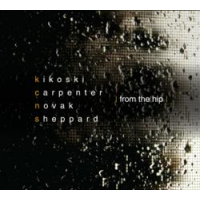 Kikoski Carpenter Novak Sheppard—From The Hip (BFM Jazz, 2013). Spontaneity and command are at the heart of jazz. The command of one's instrument making it possible to perform spontaneously with no preparation, here as engineered by pianist David Kikoski in the company of saxophonist Bob Sheppard, bassist the late Dave Carpenter and drummer Gary Novak. Add an intimate live audience and nine standards spanning seventy years and the result is that inexplicable magic that becomes jazz on the downbeat. The show hosts a nervous "Star Eyes" along side an extended "How Deep Is The Ocean," an orchestral Marian McPartland-fueled "If You You Could See Me Now" and two-fisted "Mr. PC" highlight. This was a grand surprise of 2013.
Kikoski Carpenter Novak Sheppard—From The Hip (BFM Jazz, 2013). Spontaneity and command are at the heart of jazz. The command of one's instrument making it possible to perform spontaneously with no preparation, here as engineered by pianist David Kikoski in the company of saxophonist Bob Sheppard, bassist the late Dave Carpenter and drummer Gary Novak. Add an intimate live audience and nine standards spanning seventy years and the result is that inexplicable magic that becomes jazz on the downbeat. The show hosts a nervous "Star Eyes" along side an extended "How Deep Is The Ocean," an orchestral Marian McPartland-fueled "If You You Could See Me Now" and two-fisted "Mr. PC" highlight. This was a grand surprise of 2013.  Volcan—Volcan (5 Passion, 2013). Volcan is Latin Jazz at the edge, paradoxically held down by effervescent and effusive drumming and percussion, the heartbeat of the genre. Pianist Gonzalo Rubalcaba in the company of drummer/percussionists Horacio "El Negro" Hernandez and Giovanni Hidalgo assemble complex melodies and rhythms into a nod toward contemporary jazz flying from the blade of evolution. This is no better illustrated than by than the band's rollicking, post- modern interpretation of Dizzy Gillespie's "Salt Peanuts." Rubalcaba plays synth on the intricate arrangement, propelled by percussion and cushioned by Armondo Gola's elastic electric bass. This is Latin jazz minus any cliche if not a bit too overproduced (that may have been the idea). In any case we are honored with abd by bands of this rare talent.
Volcan—Volcan (5 Passion, 2013). Volcan is Latin Jazz at the edge, paradoxically held down by effervescent and effusive drumming and percussion, the heartbeat of the genre. Pianist Gonzalo Rubalcaba in the company of drummer/percussionists Horacio "El Negro" Hernandez and Giovanni Hidalgo assemble complex melodies and rhythms into a nod toward contemporary jazz flying from the blade of evolution. This is no better illustrated than by than the band's rollicking, post- modern interpretation of Dizzy Gillespie's "Salt Peanuts." Rubalcaba plays synth on the intricate arrangement, propelled by percussion and cushioned by Armondo Gola's elastic electric bass. This is Latin jazz minus any cliche if not a bit too overproduced (that may have been the idea). In any case we are honored with abd by bands of this rare talent. 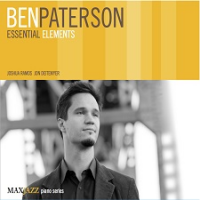 Ben Paterson—Essential Elements (MAXJAZZ, 2013). Pianist Ben Paterson releases his fourth recording in Essential Elements. He is of a generation of pianists whose style smartly integrates such a myriad of past and present players that it is not worth the trouble teasing them out at the expense of the listening experience. The disc is made up of almost equal parts originals and interpretations. Of the latter Stevie Wonder is represented twice with the superbly arranged "Golden Lady" and "I Can't Help It," both fresh as spring. The Beatles' "Here, There and Everywhere gets a gentle ballad treatment in waltz time while Ray Charles' "Hard Times" reveals Paterson's blues chops to be on par with those of Gene Harris. Essential Elements is a comfortable balance between the concert stage and cocktail lounge, both venues where this music can be enjoyed equally.
Ben Paterson—Essential Elements (MAXJAZZ, 2013). Pianist Ben Paterson releases his fourth recording in Essential Elements. He is of a generation of pianists whose style smartly integrates such a myriad of past and present players that it is not worth the trouble teasing them out at the expense of the listening experience. The disc is made up of almost equal parts originals and interpretations. Of the latter Stevie Wonder is represented twice with the superbly arranged "Golden Lady" and "I Can't Help It," both fresh as spring. The Beatles' "Here, There and Everywhere gets a gentle ballad treatment in waltz time while Ray Charles' "Hard Times" reveals Paterson's blues chops to be on par with those of Gene Harris. Essential Elements is a comfortable balance between the concert stage and cocktail lounge, both venues where this music can be enjoyed equally. 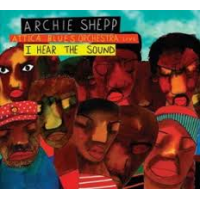 Archie Shepp Attica Blues Orchestra—I Hear The Sound (Archie Ball Records, 2013). Saxophonist Archie Shepp is so far from New Thing at Newport (Impulse!, 1965) with this reprise of his 1972 "Attica Blues" that he is now coming up on it from behind. Composed as a response to the Attica Prison riots of 1971, "Attica Blues" is a behemoth composition intent on laying waste to any piece of mind within earshot of it. Shepp effectively captures anger and grief in this piece, which was about a light year ahead of its time. The inclusion of Duke Ellington's "Come Sunday" cuts the funky butter of Shepp's larger piece. This is recorded live with a crack big band and the effects are very powerful.
Archie Shepp Attica Blues Orchestra—I Hear The Sound (Archie Ball Records, 2013). Saxophonist Archie Shepp is so far from New Thing at Newport (Impulse!, 1965) with this reprise of his 1972 "Attica Blues" that he is now coming up on it from behind. Composed as a response to the Attica Prison riots of 1971, "Attica Blues" is a behemoth composition intent on laying waste to any piece of mind within earshot of it. Shepp effectively captures anger and grief in this piece, which was about a light year ahead of its time. The inclusion of Duke Ellington's "Come Sunday" cuts the funky butter of Shepp's larger piece. This is recorded live with a crack big band and the effects are very powerful.
< Previous
Edge of Time
Next >
Sightline
Comments
Tags
Chanticleer
Bailey's Bundles
C. Michael Bailey
United States
Jimmy Giuffre
Benny Goodman
Lee Konitz
Martial Solal
Mort Weiss
Thelonious Monk
Clark Sommers
Geof Bradfield
Dana Hall
Ornette Coleman
Scott Neumann
Michael Blake
Mark Helias
Elvin Jones
David Helbock
Hristo Vitchev
Larry Koonse
Darek Oles
Hank Mobley
Idit Shner
Yitzhak Yedid
David Kikoski
Bob Sheppard
Dave Carpenter
Gary Novak
Marian McPartland
Horacio Hernandez
Giovanni Hidalgo
Dizzy Gillespie
Armondo Gola
Gene Harris
archie shepp
duke ellington
For the Love of Jazz
 All About Jazz has been a pillar of jazz since 1995, championing it as an art form and, more importantly, supporting the musicians who create it. Our enduring commitment has made "AAJ" one of the most culturally important websites of its kind, read by hundreds of thousands of fans, musicians and industry figures every month.
All About Jazz has been a pillar of jazz since 1995, championing it as an art form and, more importantly, supporting the musicians who create it. Our enduring commitment has made "AAJ" one of the most culturally important websites of its kind, read by hundreds of thousands of fans, musicians and industry figures every month.


















